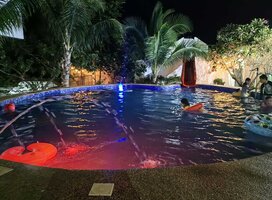English Language Schools Abroad
If you've made your way to this guide, I'm sure you don't have to be convinced to learn English.
Knowing English opens opportunities -- most of the world’s top universities are in English-speaking countries. By understanding English, you’ll be able to learn more through media (movies, radio, etc.), books, and the internet. Lastly, having English language skills provides a competitive edge and broadened employment prospects.
But to truly understand English, become fluent, and learn the culture of the English speaking world, you need to learn English abroad. Explore hundreds of English language schools and courses below and tab through our helpful guide to learn more about studying English in the U.S., Canada, England, Ireland, Scotland, Malta, Wales, New Zealand, Australia, and more!
Since English is such a popular language, there are SO many different program types available for students at all levels. When considering the best program for you, keep in mind your learning style (visual, auditory, or kinesthetic), the areas you want to improve (reading, writing, listening, speaking), and how you learn best (individual vs. group). Some of the most popular English language programs are: intensive programs, university courses, and exam preparation courses.
Program Types
- Intensive English programs: These programs are usually offered by independent English language colleges or academies, and can last from two weeks to twelve months. They are taken for personal or professional reasons, meaning no academic credit is given.
- University courses: These courses are offered at universities and colleges. University courses DO provide academic credit, and are formatted to prepare you to study further at an English-speaking college or university.
- Exam preparation courses: These programs are for intermediate or advanced learners. They are structured to prepare students to pass English language proficiency exams such as IELTS, TOEFL, or Cambridge English.
Highlights
Say Hello Like the Locals: Hi, Hey, Good morning / afternoon / evening, What’s up?, G’day! (Australia)
Fancy a Joke?
Why didn’t the skeleton go to the party? Because he had no body to go with!
Wow others with an Idiom!
“To spill the beans” means to reveal a secret or surprise either accidentally or with bad intentions.
Did you know...? The most commonly used letter in English is “e” while the least used letter is “q.”
Countries
It is most effective to choose an English-speaking country where you’ll be fully immersed in the language and can practice it daily. Some of the most popular destinations include the United States, Canada, the United Kingdom, and Australia. A large range of programs is available for all levels, and you can usually study in both urban and suburban settings. Note that each country has its own variation of English complete with colloquialisms or slang.
The United States: With its cultural and geographical diversity, it's easy to see why this is a popular place for overseas students! The U.S. is usually divided into four regions: West, Midwest, Northeast, and South. There is no single “American accent” and regional dialects vary greatly. If you want to achieve a “General American” accent that sounds neutral and free of regional markers, head to the Midwest.
Canada: Oh, Canada! The second largest country in the world is filled with friendly people, ethnic diversity, amazing natural environments (Niagara Falls anyone?), and affordable education opportunities. Canadian English has elements of both British English and American English. Despite Canada’s large size, dialects have very little regional variation in comparison with the United States.
The U.K.: The U.K., including England, has a rich heritage and long history of welcoming international students. The U.K. attracts almost half of all students who participate in an English language course abroad, with an estimated 600,000 international students each year. You will be able to travel easily both within the U.K. and to the rest of continental Europe. Although the U.K. is small, accents can still vary greatly in small distances.
Australia: Fun fact: Australia is the third most popular destination for international students (after the U.K. and the U.S.)! Expect a warm climate, laid-back lifestyle, vibrant arts scene, high standard of living, and a safe environment to study in. Like Canada, accents in Australia do not vary as greatly as in the U.S. and the U.K. Instead of differing by region, the main varieties of Australian English are sociocultural and are classified as broad, general, and cultivated. General Australian English is the most common and can be found in urban areas.
Malta:You may be surprised to see Malta on this list. However, Malta is an extremely popular place for Europeans to study English. Malta is conveniently located in the Mediterranean, just off the coast of Italy. Malta's warm and sunny climate, relative affordability, and status as a native English speaking country make it a popular English language learning destination.
Choosing an English Learning Program
When researching your options, consider a variety of factors. Ask yourself these questions: Why do I want to study English? Do I have any past experience studying English? How long can I study abroad? What program size would be best to achieve my goals?
The following websites provide comprehensive information about studying English abroad:
- EducationUSA's 5 Steps to U.S. Study – Guide that will help you research, apply, and finance your English language studies in the U.S.
- Study in Canada – General information about studying in Canada.
- EducationUK – Website with information about language centers, entry requirements, costs, and scholarships for studying in the U.K.
- Study in Australia – Information about the various types of English training in Oz.
Qualifications
Qualifications vary by program so always confirm the application and admissions process directly with the company or provider. Some programs may require evidence of your English language abilities (transcripts, separate testing, etc.) to make sure that you’re placed in the appropriate level.
Visa requirements depend on your nationality and length of study. Check the following websites to find out if you will need a visa to study in the U.S., Canada, the U.K., or Australia. If a student visa is required, your program will usually provide the appropriate paperwork to verify your enrollment for your visa application.
Level of Difficulty
It’s no secret that English is one of the most confusing languages to learn, with complex rules that even native speakers can mix up. Your own native tongue will determine how difficult it will be to learn English. For example, native speakers of German (closely related to English) will find the language easier to learn than someone whose first language is Chinese (not related to English). Absolute beginners should look for small group courses or private tutoring for the most attention and support. Those who want a casual experience can enroll in short-term programs lasting only a few weeks. Serious learners should seek longer courses for a semester or year, or exam preparation courses.
Length of Program
How quickly you can become proficient depends on the amount of time spent practicing and your level of motivation. While it’s impossible to determine the “average” time it takes to become conversational in English, it is commonly argued that you need 12 weeks or 360 hours of instruction to reach the intermediate level. Your language abilities will continue to improve the longer you live abroad and practice English, but that doesn’t mean that short-term programs aren’t valuable too!
According to HSBC, Australia is the most expensive country for international students to study in, followed by the U.S. and the U.K. Depending on your student visa, it may be possible to work part-time to offset expenses while abroad. To save money, choose smaller cities (meaning stay away from New York City if you’re on a tight budget), cook your own meals, opt for cheaper housing, and take advantage of free events.
Scholarships
There are few general scholarships that can be applied towards any ESL program. Most scholarships are offered by a specific university or company and are available to enrolled students. Here are some examples:
- Sacred Heart University Intensive English Language Scholarship – This scholarship covers tuition and books, and is available to students who are enrolled in the ESL program at Sacred Heart University in Fairfield, CT, USA.
- Columbia College ESOL Tuition Grant – This grant can cover 15% of tuition for students admitted to the ESOL program at Columbia College, MO, USA.















